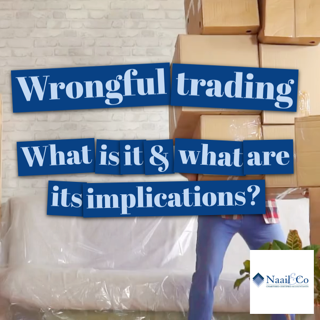Wrongful trading: What company directors need to know?
Table of Contents
Failing to act in the interests of creditors once it is clear that a business is failing can have serious legal and financial consequences for company directors.
What is wrongful trading?
Wrongful trading occurs when directors allow a company to continue to incur debts even though the business is no longer viable, and the directors knew or ought to have known there was no reasonable prospect of the company avoiding entering an insolvency process.
What do I need to know as Company Director?
The company directors might not be aware that by permitting business operations to continue as the company’s financial situation deteriorates, they may be held liable for improper trade once bankruptcy proceedings have begun. The directors could be held personally accountable by a court order for losses to creditors.
Although not a criminal offence, wrongful trading can incur a civil liability under section 214 and section 246ZB of the Insolvency Act 1986. In addition, it could lead to an individual being disqualified from acting as a company director for a period of time.
Once it is obvious that a business is collapsing, company directors may face severe legal and financial repercussions if they fail to act in the interests of creditors. Remember that ignorance is not a defence, even in cases when directors are not aware that they are engaging in illegal trading. This is why it is crucial that directors consult an insolvency practitioner as soon as possible if they believe the company is no longer sustainable.
When a business fails to make payments on its debts but is not undergoing an insolvency process, creditors may take enforcement action to recover money owed to them by obtaining a judgement and seizing company assets or by securing a “charge,” which prevents the sale of property or assets without the creditor’s consent.
It is also open to creditors who do not have a charge to seek to liquidate the company through the courts. For creditors, the cost of bringing a claim should be considered carefully and it may not always be financially sensible to take this course of action, especially if they cannot identify any assets belonging to the company.
If creditors believe there may be a claim for wrongful trading, they should approach the appointed administrator or liquidator to explain what they think has happened and provide evidence to support their claims, such as details of the debts incurred and correspondence with the company.
Administrators or liquidators will need to review business documents and consider what the directors may or may not have known while the business was still operating once an investigation into a claim of improper trade has begun.
A thorough examination of the minutes from board meetings may also be conducted in order to pinpoint the moment that directors realised that the business would not be able to avoid insolvency proceedings, and what action was taken from this point.
In every case of liquidation or administration, practitioners will carry out an investigation into the reasons for the company’s failure. They are likely to examine bank statements to see who has been paid and who has not, and consider creditor schedules and other accounting information to build up a picture of the financial position at the date when the directors realised the business was unviable.
The insolvency practitioner will look at what the directors did at this point, including whether they sought legal or financial advice. Did they review the books and take action to prevent losses? Did they ignore the issue altogether?
After building a case, the insolvency practitioner could make an application for a court hearing, where the directors might be ordered to pay money into the insolvent business to provide compensation for the worsening financial position.
Directors need to understand their duties and take their responsibilities to meet creditors’ payments seriously, especially in situations where the business could be at risk of insolvency.
Creditors also need to know that if they have overdue debts, they have a number of options open to them. They should seek financial advice as soon as they can. Ultimately, it could be their action that forces the business to enter insolvency proceedings. This could then allow an insolvency practitioner to bring a claim through the civil court in order to recoup losses to creditors.

Related pages:
Get further information from the following pages;
Related Blogs:
Get further information from the following blogs;
Compulsory liquidation costs to rise
Am I liable for the new Plastic Packaging Tax PPT
EU blocks minimum corporate tax deal
Late tax payment interest rate raised to 2.75%
Crackdown on directors who dissolve companies to evade debts
Extended loss carry back rules
Tax on subsidised workplace meals
Our service to you
If you are a self employed, business owner/director of company looking to get your accountancy and taxation matters sorted, look no further. We, at Naail & Co, are pro-active and easily accessible accountants and tax advisors, who will not only ensure that all your filing obligations are up to date with Companies House and HMRC, but also you do not pay a penny more in taxes than you have to. We work on a fixed fee basis and provide same day response to all your phone and email enquiries. We will also allocate a designated accounts manager who would have better understanding of your and business financial and taxation affairs. Book a free consultation call using the link below.
Subscribe to our newsletter
BUSINESS HOURS
Monday – Friday
- 9:00 am – 5:30 pm
Pages:
Menu








